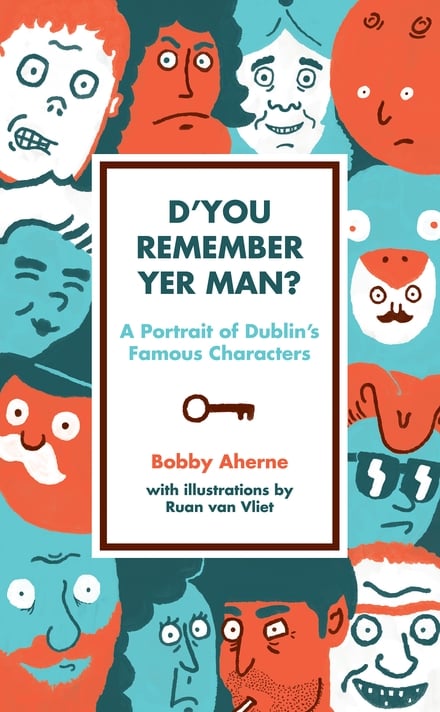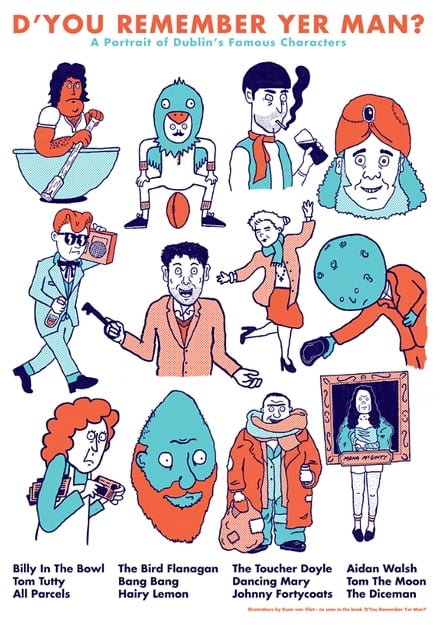Bobby Aherne's book D'You Remember Yer Man? celebrates some "weird and wonderful Dubliners from down through the years" and has just been published by New Island. He brings Harry Guerin on a lengthy stroll down Memory Lane.
Harry Guerin: Congratulations on the book - a great little read that puts lives to names and faces. Did your fascination come with hearing stories about them as a child, or did you encounter some characters in real life to kick-start your interest?
Bobby Aherne: Cheers! Well… growing up in Blanchardstown, there was a local 'Fortycoats' (every area seems to have had one), a lady called Jenny (who had an army of dogs and a goat in a buggy) and somebody who had been dubbed 'Two Litre Peter' due to his great love of flagons. I also remember my dad chatting to Pat Ingoldsby at his pop-up bookshop on Howth pier, and being so intrigued when I heard that this guy was once a household name.
After moving into the city, I got used to seeing the incredibly flash Brendan Kilkenny all over the place, and remembered his own time in the limelight. I guess I've always been fascinated by outsiders, and the size of Dublin definitely lends itself to these unique individuals seeming omnipresent and becoming beloved familiars.
What's your take on why you're the first person to gather them all together in the one book?
That's what I'd like to know myself - I always thought that there was a book about everything. Although I was initially frustrated about the fact that this didn't already exist, I'm obviously now quite glad that nobody had gotten around to this; it gave me a good excuse for an amazing adventure through Dublin history. I felt like Alice going down the rabbit hole, or Ash Ketchum filling up his Pokdex, as I sifted through Dublin lore and discovered so many entertaining anecdotes and exciting tidbits of information. It was quite the trip.
That said, I was constantly anxious whilst working on this: whenever I passed a bookshop, I'd go in and scan their 'Dublin' section, expecting somebody to have beaten me to the punch. But as soon as I conceived of this book, I had a very specific idea for its voice, tone and appearance. It felt like my calling, if not my civic duty…

How many of these people were you aware of and how many did you discover during the course of your research?
I definitely would've heard plenty of these names being bandied about - but I talked to so many people who'd know names but very little else. This still helped me to whittle my list down to around 100 of the most common characters.
I had to dig deep to assemble the gang that I found - and as is the nature of folklore, stories change quite drastically as they're passed along, so it was a bit of a mission to try to get the actual facts about some of these enigmatic people. That wasn't always possible… but that ended up working out ok, as it added a nice air of mystery to the book; for example, there was a guy called 'Lino' who I insisted should get a full page to himself, even though his entry is literally one sentence long.
You're only a young fella, so who were the older people that were a big help in bringing to life the people you write about?
Éamonn Mac Thomáis was somebody who really triggered my passion for Dublin and the culture of the city - his TV show Dublin: A Personal View is so entertaining and informative, but he's never hitting you over the head with a history lesson. His books are all exactly the same - it feels like he's just yapping away to you over a pint or something. My Gran, Phyl Murphy, was able to hook me up with some great old books - between her collection, charity shops, libraries and archives, I read heaps of books about Dublin life, which helped to give a better feel for the city over the past few centuries.
I guess I owe it to everyone who has ever lived in Dublin for passing on these memories for us to inherit. The book also took some external cues from Roald Dahl, The Book of Imaginary Beings and [radio show] Scharpling and Wurster's fictional town of Newbridge.
Who are your own particular favourite characters of yore?
One of my favourite things in the world is a good silly name, so I have a real fondness for the likes of 'The Toucher Doyle', 'Slep' with the Nuns', 'Annie Fruitcake' and 'The Female Oddity'. I love how evocative a sharp, succinct nickname can be, as well as how they often usurp the person's actual name - despite being born out of a momentary incident or a minor personality trait.
Was it hard to get the tone right? In that some of the people you write about lived with mental illness or were destitute?
Having spent a few years investigating this crew, it felt like they were my pals by the time I got around to writing the actual text - which I did so with a friendly nostalgia, as these people are my dream dinner party guests.
Although a lot of the stories are told with a bit of a raised eyebrow and a playful tone, there's nothing snide, disrespectful or patronising about it. And only a few of the one-hundred-plus people included suffered from any sort of mental illness… and wherever possible, I avoided mentioning it, because I don't think that should define a person (and there's enough over-diagnosis going on these days, without me joining in). Instead I focused on the unique aspects of their personalities and the ways in which they were memorable and became beloved in the minds of their peers.
The book isn't a freakshow or a joke book: it comprises musicians, dancers, poets, entrepreneurs, writers, photographers, publicans, sportsmen - extraordinary ordinary people from all walks of life who managed to make an impression. 'Bang Bang's 'thing' was that he ran around Dublin shooting people with a key. He was much loved, despite - and as a result of - being slightly dotty. Just like 'Johnny Fortycoats', he loved being a 'character' and absolutely revelled in the attention. Should we not talk about him, because he didn't fit in with some idea of 'normality'?
These tales needed telling and I think that I did so with a great deal of respect, admiration, and - at times - kinship. So to actually answer your question - no, I didn't even have to try!
Do you think there's something in the Irish, or indeed Dublin psyche, that encourages people to be odd or extrovert?
The Irish imagination has been pretty remarkable throughout history, but anybody could say the same thing about wherever they're from. I could probably put together a D'You Remember Yer Man? for any city in the world (although it wouldn't be half as good, of course).

Illustrations: Ruan van Vliet
You worked in the Leprechaun museum - I didn't realise there was such a thing until recently! Any surreal encounters with the general public, and do you think working there inspired your book in any way?
Oh yeah - if I hadn't somehow ended up working there, this book wouldn't exist. They give their storytellers free rein, so I was basically left to my own devices to put together a tour. I liked to switch it up as much as possible, so I was constantly researching old folk and fairytales - which is where I ended up bumping into 'Bang Bang' and co.
A good few people came into the museum with an attitude of total derision, having been dragged along by their kids or whatever. An hour later, they'd be drawing a picture of the salmon of knowledge with a big smile on their face, or telling me about their granny's experience with a fairy tree. That was always a pleasure to witness. I also got some complaints though - one woman was furious that we didn't have actual leprechauns in cages, and an American lady genuinely looked for a refund because she claimed that my leprechaun origin story was all wrong. "They're midget Vikings!" she yelled.
I also had to adapt all of these ancient legends depending on who I was talking to, whether it was group of 10 Russian kids or a pair of pensioners from The Liberties - as a result of that, I'd like to think that was able to write the book in a way that's accessible and relatable to a variety of ages and nationalities, as well as people who don't remember yer man.
What's your advice to someone who thinks, 'I've got an idea for a book about where I'm from'?
Assume that the reader knows nothing about where you're from, and has never been there. Try to make us start researching a trip there, a few pages in. Something practical that I didn't realise myself is that with most non-fiction, you don't need to actually finish the book before submitting it to a publisher. That said, you should only write a book if you're going to enjoy doing it, whether or not it ends up getting published.
So, what's your next book?
I'm working on something called The Boyhood Deeds, which is about a young fellow's adventure through a series of old Irish folk tales. There will be leprechauns, for example, but they will not be of the 'top o' de mornin'' variety. Writing fiction after doing a historical book is a real relief - you can really let loose when don't have to fact-check every single word.
And do you have a nickname yourself?
Oh boy. I'm lucky enough to have a child's name that is very prone to improvisation - off the top of my head, I've been forced to answer to the likes of 'Bobzebeto', 'Bobsleigh' and 'The Bobster'. Cultural references pop up too, like 'Bobby Boucher' and 'Fun Bobby' (which can be a lot of pressure)… I even got 'Bobby-Brown-Break-It-Down' for a spell. A few years ago, a badly researched mention in the Irish Independent led to me becoming 'Local Rapper Bobby Aherne' (which I'm all for). And last but not least, my granny used to call me 'Mister Kilphobeecack', although we never figured out where that one came from.
D'You Remember Yer Man? is published by New Island Books.
Anda sedang membaca artikel tentang
Dublin's characters celebrated in new book
Dengan url
http://entertainmentopoke.blogspot.com/2015/01/dublins-characters-celebrated-in-new.html
Anda boleh menyebar luaskannya atau mengcopy paste-nya
Dublin's characters celebrated in new book
namun jangan lupa untuk meletakkan link
Dublin's characters celebrated in new book
sebagai sumbernya
0 komentar:
Posting Komentar